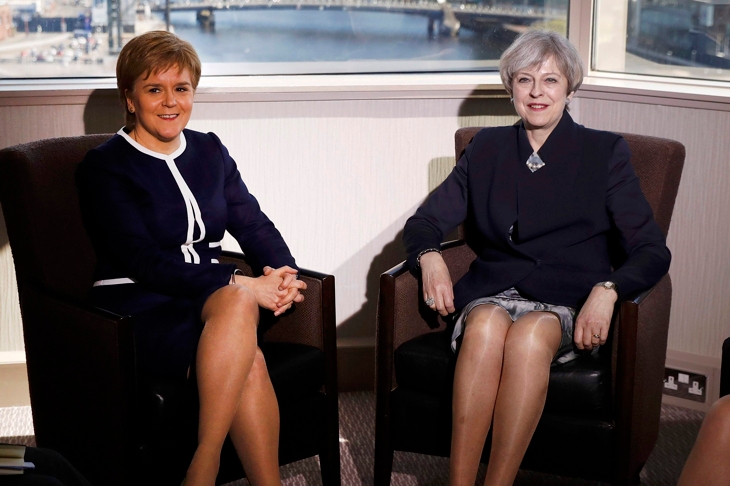For the last week, the Unionist opposition at the Scottish parliament has enjoyed observing that the Scottish government is happy to ignore non-binding votes at Holyrood when it suits them to do so but now expects the UK government to be bound by today’s vote authorising the Scottish government to seek a Section 30 order that would begin the process by which a lawful second referendum on independence can be held.
It is a neat line but an insufficient one, not least since this vote – unlike some of those on which the SNP government has been defeated – actually recommends a particular course of action that the government should follow. In like fashion, the Unionist argument that we are in materially different circumstances from those that pertained in 2012 when all the parties agreed there were grounds for a plebiscite is, while correct, also insufficient. The fact of the matter is that votes count more than manifesto commitments and if the government has the numbers, it has the votes. As Lyndon Johnson once observed, the first task in politics is knowing how to count.
And so, as I type this, the Green party are supporting the SNP’s demand for a second referendum. The two-day debate – though both ‘day’ and ‘debate’ are doing some work there – curtailed last week following the attack at Westminster resumed and concluded today. Few new things were learned.
Save, perhaps, this: opinions, which were not soft before, have hardened still further since Nicola Sturgeon launched this latest constitutional gambit. As Kezia Dugdale, leader of the Scottish Labour party, put it, ‘These benches will campaign with all our heart to remain in the United Kingdom.’ That’s a necessary but insufficient condition for Unionist victory, of course.
Still, the question of timing cannot be avoided forever. Theresa May, it is quite clear now, has next to no intention of humouring the SNP. She cannot now agree to a referendum even in 2019. The new Tory line is that not only must we wait for the full detail of Brexit to be known, the reality of life after Brexit must be given time to ‘bed in’ before Scotland can make an informed choice about its constitutional future. In other words, the Tories still think they can push this beyond the 2021 Holyrood elections.
Perhaps they can. There is little Nicola Sturgeon can do to press the issue. She could conceivably contrive a crisis at Holyrood and force a snap election on a clear commitment to reopen the never-actually-closed constitutional question but this would risk looking contrived and even absurd. And, besides, what if she did not win a majority?
But that is also one of the many reasons why Sturgeon is keen on a referendum before 2021 too. What if no pro-independence majority is returned then? As matters stand, that would be something close to a 50-50 proposition and a hefty gamble on the fate of a nation.
The SNP remain the dominant, most popular, force in Scottish politics but the country is afflicted with a severe case of referendum fatigue. That explains the shift in the SNP’s own rhetoric, from expressing the people’s will for another referendum to highlighting the Scottish parliament’s enthusiasm for a second plebiscite. Granted, that parliamentary will means something and cannot be denied, least of all by a UK government that is, we are told, in the business of ‘taking back control’ and reasserting parliamentary sovereignty.
This is a long, long, game however. At the very least it has another 18 months to run and probably much more than that. There is no need to rush, no need to waste your artillery now. May’s mantra ‘now is not the time’, however, concedes there could and even should be a time at some point in the future. Eventually she will have to say what that time might be; eventually even this tight-lipped Prime Minister will have to actually say something.
She didn’t do that on her fleeting visit to Scotland yesterday, a trip which was in almost every single respect so pro forma it verged on being pointless and, even, mildly patronising. One day it should not be ‘news’ that the Prime Minister comes to Scotland; one day she might actually say something notable when she is here. Perhaps in early 2019.
Now we must enjoy or endure the ‘mandate wars’. Sturgeon is equipped with a mandate from her parliament to press the case for a referendum; May believes herself mandated to press ahead with whatever kind of Brexit she deems in the national interest.
As recently as last year, a senior British politician noted that ‘if Brexit isn’t fatal to the European Union, we might find that it is fatal to the Union with Scotland’. That politician was Theresa May. If – and I concede this may be thought unlikely – those words meant anything, it is time for the Prime Minister to reflect upon them and consider their meaning. That would require the kind of Brexit deal which went some way towards torpedoing the SNP’s case for a second referendum. But all the signs are that May has no intention of seeking that kind of Brexit and, indeed, actively prefers the kind that most risks precisely the post-Brexit outcome she herself deplored less than a year ago. Politics, of course, is a funny old game.







Comments